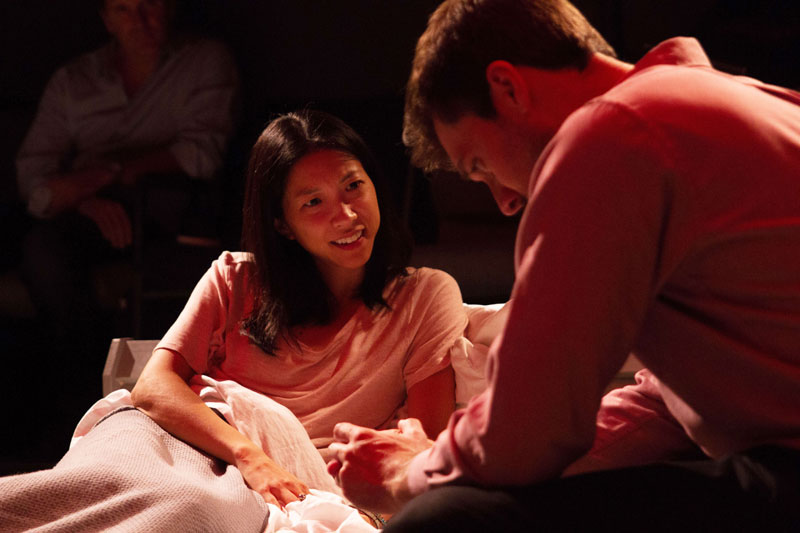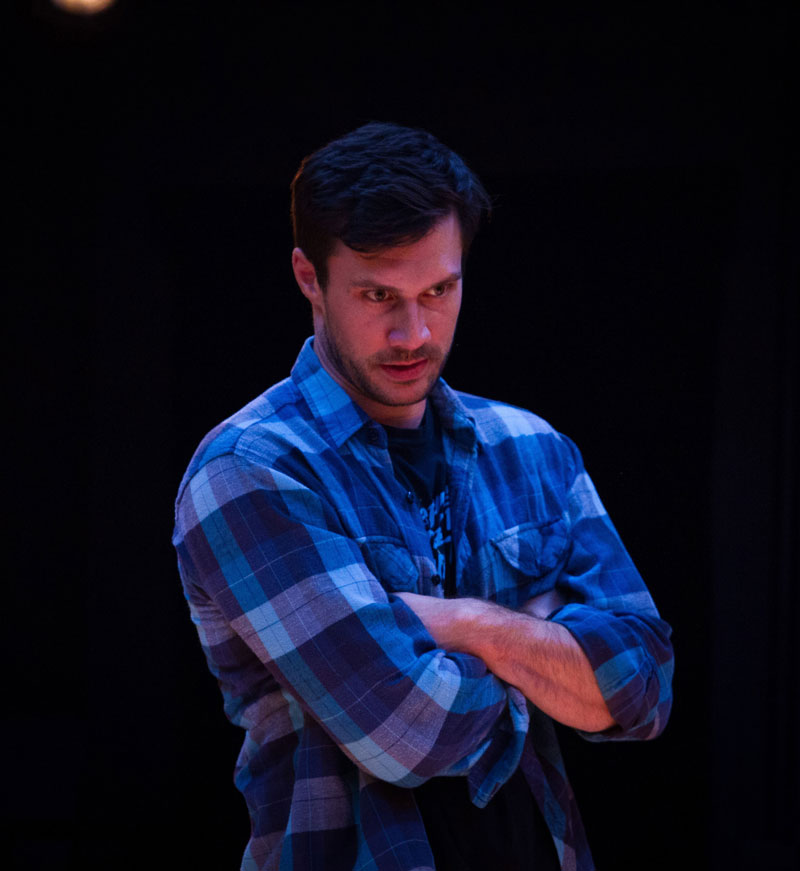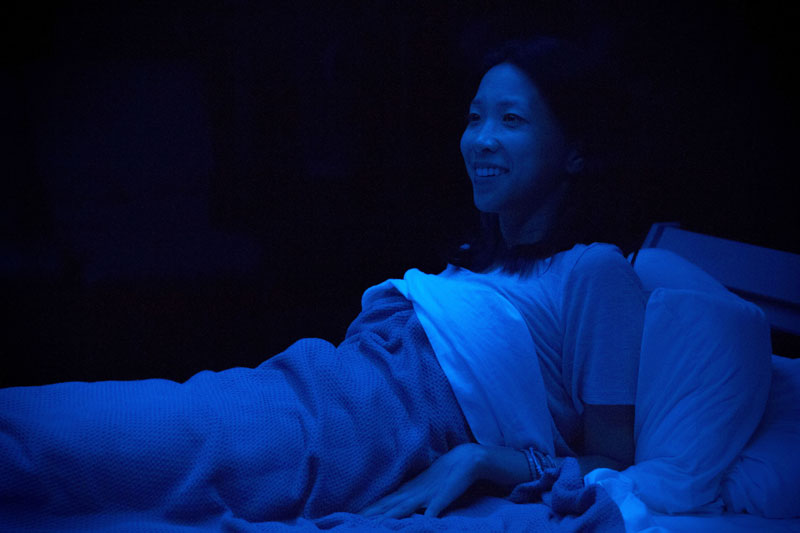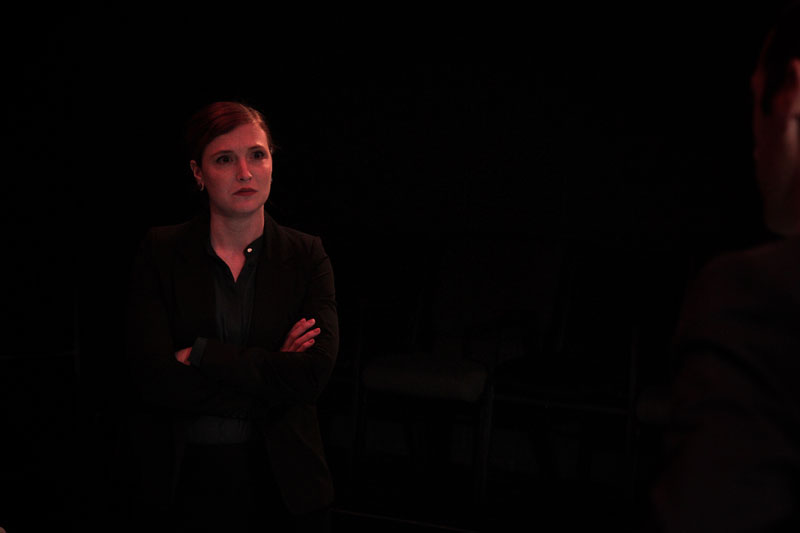Theater Review: “Charlotte Stay Close” at Ensemble Studio Theater/LA
When entering the intimate space of Ensemble Studio Theater/LA to see “Charlotte Stay Close,” the new play by Christine Hamilton-Schmidt, directed by Jonathan Muñoz-Proulx, excessively sunny Los Angeles immediately feels very far away. The audience is seated on all four sides around a sparse, elegant set consisting of a bed and two chairs. There is an open, square structure hanging from the ceiling. It evokes a skylight, and, at the same time, the neon lighting of a hospital room.

The pre-show aural effects are subtle and gradually become hard to ignore, not that ignoring them should be considered a desirable goal. The tones (in a sound design by Stephen George that is uniformly excellent throughout the play) flow from what might be music to something that sounds like whale vocalization to a possible recreation of satellites orbiting. There is a sense of wonder, and vastness, that stays as a theme throughout the performance.

Any apprehension that sightlines will render a character’s facial expressions unknowable is immediately allayed at the transition from the first scene to the second. In choreography that can only be described as mesmerizing, the actors change the perspective of the hospital bed so that it faces each side of the theater more than once during the course of the show.
Charlotte (Jenny Soo, in one of two alternating casts) is dying of cervical cancer. She has come home to the town where she grew up. Her sister Kathryn (Tarah Pollock) and Kathryn’s husband Dustin (Andy Shephard) have made a commitment to visit Charlotte every day while she is in hospice care. This commitment, it is revealed early in the story, will not be a lengthy one. Charlotte tells her sister that she won’t be around long enough for a miracle cure for cancer to be discovered; she feels that her death is already beginning.
A deceased mother and an absent father, each one remembered very differently by their daughters, are imposing presences in the lives of these three characters. Inanimate objects on the set, actual or spoken of, also play important roles. A water glass and carafe on the nightstand beside Charlotte’s bed are alternately the source of comfort and tension. When Kathryn keeps insisting that Charlotte drink and Charlotte tells her she doesn’t want to, Kathryn practically drowns Charlotte by shoving the glass in her face, declaring “I want to hydrate you.”
Never has the promise of life-sustaining liquid felt so threatening.
Kathryn is a study in the contradictions that can encompass the layers of a relationship. She alternates, sometimes at lightning speed, between compassion and cruelty. And none of it will be put on hold just because her sister is going to die at any moment.

Indeed, as “Charlotte Stay Close” makes painfully clear, the world does not stop for imminent death. Anger, jealousy, selfishness – they will not be suppressed just because a young woman has no future left.
Much is made in this story of the fact that Kathryn and Dustin met in high school and married young. Their marriage is now in serious trouble. Kathryn, in a breathtaking display of narcissism, keeps asking her dying sister to tell her what to do about the relationship. When Charlotte’s answers aren’t clear enough, Kathryn tells her: “I really need you to make sense. This isn’t helping me.”
These are among the least unkind words Kathryn says to Charlotte in the course of the play.

In this atmosphere of anguish and despair, the actors give stunning performances. Every moment rings true, every piece of dialogue is honored. As Kathryn, Tarah Pollock – somehow, somewhere, in a way that is almost impossible to track – creates sympathy and a shade of understanding for this profoundly damaged character. Jenny Soo, as Charlotte, mines new levels of heartbreak. By the time it comes, her death will likely feel like a personal loss to the audience, and this reaction has been more than earned. Dustin is, at times, torn between the sisters. Andy Shephard makes his role in this triumvirate devastatingly painful and surprisingly charming.
The performers are aided by an impeccable script that brings humor to situations that feel impossible to make light of, by direction that makes everything work in seamless harmony, and by technical aspects that are a collective masterclass on how to stage a play.
The result is a production that is not to be missed.
Performances extended through November 3 at:
Ensemble Studio Theater/LA
3269 Casitas Ave. LA CA 90039
For information and tickets:
https://www.estlosangeles.org/







